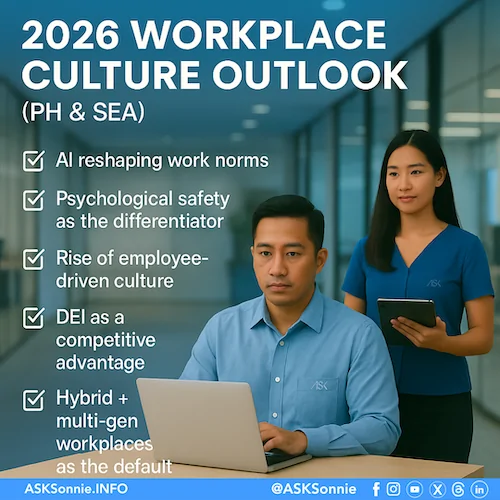AI is reshaping workplace culture across the Philippines and Southeast Asia. By 2026, its influence will be felt not only in workflows, but in trust, leadership norms, collaboration, and the psychological contract between employers and employees.
Workplace Culture 2026 Outlook): The findings from the article “5 Trends That Will Shape Workplace Culture In 2026”, are validated against Philippine and Southeast Asian data, along with other international research signals, to assess whether these global workplace trends also hold true in our local and regional context.

This recent Forbes analysis (“5 Trends That Will Shape Workplace Culture in 2026”) forecasts massive global shifts in how organizations adapt to AI. But for the Philippines and Southeast Asia, the real challenge is understanding how these forces land in our cultural context — where collectivism, hierarchy, multi-generational dynamics, and emerging digital maturity coexist.
Drawing from global and regional signals — including research from HR.com, AIHR, IMF reports covered by the Inquirer, JobStreet’s SEA DEI study, Great Place to Work PH, GINI Talent SEA insights, and INS Global Consulting — here’s what AI-driven culture shift will look like in 2026, interpreted through the ASK Framework.
1. AI is Reshaping Work Norms in 2026
- Global View: AI is redefining workflows, decision-making norms, and team expectations. As noted in the Forbes 2026 culture report, culture will either adapt or get displaced by AI-driven work models.
- PH/SEA Reality: The IMF estimates that 36% of Filipino jobs are highly exposed to AI—especially in admin, finance, retail, marketing, and HR.
- Most “at-risk” roles are expected to be augmented, not eliminated, requiring continuous reskilling (as observed by NuCamp PH).
- Employee sentiment surveys from Ipsos, SEEK, and LinkedIn show dual emotions: excitement about efficiency gains and fear about job displacement.
- Younger employees embrace AI quickly; older employees show higher anxiety as companies adopt AI faster than policy updates.
Key Insight:
AI adoption succeeds in PH/SEA when organizations prioritize trust, clarity, fairness, and transparency, as highlighted by PeopleHum and DataOn.
2. Psychological Safety & Trust: The Make-or-Break Factor
- Global Insight: HR.com notes that psychological safety accelerates AI adoption and organizational learning.
- Local Data: Philippine workers experience moderate psychological safety but high daily stress, according to the Asian Journal of Humanities and Social Studies (E-Palli).
- Cultural Factors: Filipino norms like “hiya,” “utang na loob,” and “pakikisama” can inhibit speaking up, raising concerns about AI-driven monitoring or workload change.
- Top Performers: Organizations recognized by Great Place to Work Philippines show that teams with strong psychological safety excel during AI transformation.
Psychological safety is harder in PH/SEA — but transformative when achieved.
3. Employee-Driven Culture: Slowly Rising in the Region
- Global Trend: Workers increasingly want a voice in how work is designed and delivered.
- SEA Shift: Gen Z and Millennials now form the majority of the SEA workforce and expect participatory leadership, as reported by GINI Talent.
- PH organizations are adopting:
- engagement surveys,
- pulse checks,
- “voice of employee” feedback loops,
- co-created workflow redesigns.
- Traditional top-down managers experience friction with Gen Z workers who expect openness and authenticity, as observed by INS Global Consulting.
4. Values Alignment & DEI: A Competitive Advantage in SEA
- Global Context: DEI conversations in the West have become politically polarized.
- SEA Reality: The Philippines leads the region in DEI adoption, with 63% of companies implementing DEI programs, according to JobStreet’s regional DEI report.
- DEI in SEA is driven by:
- employer branding,
- global mobility,
- fairness expectations,
- ESG compliance.
- Younger talent demand inclusive benefits and psychologically safe environments (GINI Talent).
In PH/SEA, DEI is not politics — it’s competitiveness.
5. Adaptive, Hybrid, Multi-Gen Culture: Non-Negotiable by 2026
- Global Trend: Future-ready cultures blend flexibility, digital skills, and multi-gen collaboration.
- SEA Reality: Hybrid work remains highly preferred in the Philippines but is limited by infrastructure, according to GINI Talent.
- Generational Differences: SEA workplaces host four generations with different work values and digital proficiency levels, as documented by INS Global.
- AI amplifies skill gaps: digital natives adapt fast, while older workers need structured learning support.
The culture battles of 2026 will be about fairness, readiness, and flexibility — not just technology.
ASK Framework Roadmap: AI and Workplace Culture Transformation
A — ALIGN
- Publish a clear Future of Work 2026 stance outlining AI’s role, boundaries, and ethical guardrails (PeopleHum; DataOn).
- Align hybrid policies, performance expectations, and leadership norms with regional realities.
- Anchor culture on fairness, inclusion, accountability, openness, and psychological safety (E-Palli Journal; GPTW PH).
S — STRENGTHEN
- Upskill leaders first: AI literacy, adaptive leadership, coaching, and change management (AIHR; HRTeamServices).
- Strengthen listening and transparency with pulse surveys, psychological safety scoring, and AI impact assessments.
- Build governance: ethical guidelines, privacy hygiene, and risk mitigation (NuCamp PH; PeopleHum).
K — KICKSTART
- Launch 1–2 AI pilot programs and involve employees in co-designing workflows (NuCamp PH).
- Introduce psychological safety rituals such as:
- “What did we miss?” checkpoints
- silent brainstorming
- speak-up Fridays
- Form a multi-generational culture board to bridge digital fluency and work experience (INS Global; GINI Talent).
- Develop a 12-month DEI roadmap including inclusive facilities, mental health benefits, anti-harassment channels, and gender-fair job ads (JobStreet).
Conclusion
AI amplifies the culture you already have.
Fearful cultures become more afraid.
Authoritarian cultures lean toward surveillance.
Participatory cultures become more innovative.
Trust-driven cultures accelerate transformation.
By 2026, organizations that succeed will be those who — through Alignment, Strengthening, and Kickstarting — put people and culture first, not technology alone.
That is the strategic value of the ASK Framework.
For deeper insights on culture and leadership, explore our cornerstone article:
ASK Framework: Align • Strengthen • Kickstart.
Frequently Asked Questions
How will AI affect workplace culture in the Philippines?
AI will influence communication norms, performance standards, trust dynamics, collaboration patterns, and employee expectations. Its impact depends heavily on leadership maturity and psychological safety.
Which Filipino industries are most exposed to AI?
Admin, finance, HR, retail, BPO, and certain manufacturing roles face the highest exposure, according to IMF and local HR insights.
How do generational differences affect AI adoption?
Gen Z adapts quickly to AI tools, while older workers need structured support. Without intentional design, AI can widen generational gaps.
Is DEI still growing in Southeast Asia?
Yes. DEI continues to expand due to employer branding, global mobility, fairness expectations, and ESG compliance.
How can organizations safely start AI transformation?
Start with small pilots, create psychological safety rituals, build leader capability, and implement ethical AI governance.
ASK Takeaway — Applying the ASK Framework to AI & Workplace Culture:
- Align culture, values, policies, and leadership expectations with AI realities.
- Strengthen both leadership capability and people systems to support AI integration.
- Kickstart trust-building, multi-gen collaboration, and inclusive AI transformation.
Explore more leadership insights at our cornerstone page:
ASK Framework: Align • Strengthen • Kickstart





